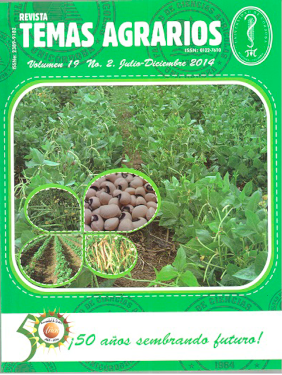Respuesta vegetal de acacia decurrens a la inoculación con rizobacterias promotoras de crecimiento vegetal bajo estrés salino
Vegetal response of Acacia decurrens to inoculation with plant growth promoting rhizobacteria under salt stress

Esta obra está bajo una licencia internacional Creative Commons Atribución-NoComercial 4.0.
La Revista permite al autor(es) mantener los derechos de explotación (copyright) de sus artículos sin restricciones. El(os) autor(es) acepta(n) la distribución de sus artículos en la web, bajo acceso abierto a nivel local, regional e internacional; la inclusión y difusión del texto completo, a través del Portal de Revistas y Repositorio Institucional de la Universidad de Córdoba; y en todas las bases de datos especializadas que la Revista considere pertinentes para su indexación, con el fin de proporcionarle visibilidad y posicionamiento al artículo. Esta revista provee acceso libre inmediato a su contenido bajo el principio de hacer disponible gratuitamente la investigación al público, lo cual fomenta un mayor intercambio de conocimiento global.
Se autoriza la fotocopia de artículos para fines de uso académico o interno de las instituciones, citando la fuente, para impresos dirija la solicitud a la Revista Temas Agrarios. Facultad de Ciencias Agrícolas. Universidad de Córdoba. Montería. Colombia,. Apartado aéreo No.354, correo electrónico: revistatemasagrarios@correo.unicordoba.edu.co
Esta obra está bajo una licencia de Creative Commons Reconocimiento NoComercial 4.0 Internacional.
Mostrar biografía de los autores
Visitas del artículo 870 | Visitas PDF
Descargas
- Babana, A., Dicko, A., Maïga, K. and Traoré, D. 2013. Characterization of rock phosphate-solubilizing microorganisms isolated from wheat (Triticum aestivum L.) rhizosphere in Mali. Journal of Mıcrobıology and Mıcrobıal Research 1(1):1-6.
- Bacilio, M., Rodriguez, H., Moreno, M., Hernandez, J. and Bashan, Y. 2004. Mitigation of salt stress in wheat seedlings by a Azospirillum lipoferum. Biology and Fertility of Soils 40:188-193.
- Bashan, Y., Holguin, G. and De-Bashan, L. 2004. Azospirillum plant relationships: physiological, molecular, agricultural, and environmental advances (1997- 2003). Canadian Journal of Microbiology 50(8): p521-577.
- Bhattacharyya, P. and Jha, D. 2012. Plant growth-promoting rhizobacteria (PGPR): emergence in agriculture. World Journal of Microbiology and Biotechnology 28(4):1327-1350.
- Calvachi, B. 2012. Los ecosistemas semisecos del altiplano cundiboyacense, bioma azonal singular de Colombia, en gran riesgo de desaparición. Mutis 2(2):26-59.
- Chen, Y., Rehha, P., Arun, A., Shen, F., Lai, W. and Young, C. 2006. Phosphate solubilizing bacteria from subtropical soil and their Tricalcium phosphatesolubilizing abilities. Applied Soil Ecology 34:33-41.
- Costa, E., Nóbrega, R., Carvalho, F., Trochmann, A., Ferreira, L. and Moreira, F. 2013. Plant growth promotion and genetic diversity of bacteria isolated from cowpea nodules. Pesquisa Agropecuária Brasileira 48(9):1275-1284.
- Das-Neves, J., Ferreira, L., Vaz, M. and Gazarini, L. 2008. Gas exchange in the salt marsh species Atriplex portulacoides L. and Limoniastrum monopetalum L. in Southern Portugal. Acta Physiologiae Plantarum 30:91-97.
- Dubois, M., Gilles, K., Hamilton, J., Rebers, P. and Smith, F. 1956. Colorimetric method for determination of sugars and related substances. Analytical Chemistry 28(3):352-356.
- Fiske, C. and Subbaro Y. 1925. The colorimetric determination of phosphorus. Journal of Biological Chemistry 66:375 p.
- Ghosh, S., Sengupta, C., Maiti, T. and Basu, P. 2008. Production of 3-indolylacetic acid in root nodules and culture by a Rhizobium species isolated from root nodules of the leguminous pulse Phaseolus mungo. Folia Microbiological 53:351-355
- Glickman, E. and Dessaux, Y. 1995. A Critical examination of the specificity of the salkowsky reagent for indolic compounds produced by phytopathogenic bacteria. Applied and Environmental Microbiology 61(2):793-796.
- Goswami, D., Dhandhukia, P., Patel, P. and Thakker, J. 2014. Screening of PGPR from saline desert of Kutch: Growth promotion in Arachis hypogeal Bacillus licheniformis A2. Microbiological Research 169(1):66-75.
- Hajlaoui, H., Denden, M. and Bouslama, M. 2006. Effet du chlorure de sodium sur les critèresmorpho-physiologiques et productifs du poischiche (Cicer arietinum L.).]– Annales de Institut National de Recherche en Génie Rural Eaux et Forêts 8:171-187.
- Illmer, P. and Schineer, F. 1995. Solubilization of inorganic calcium phosphates solubilization mechanisms. Soil Biology and Biochemistry 27(3):257-263.
- Joseph, B., Ranjan, P. and Lawrence, R. 2007. Characterization of plant growth promoting rhizobacteria associated with chickpea (Cicer arietinum L.). International Journal of Plant Production (1):141-152.
- Kang, S., Khan, A., Waqas, M., You, Y., Kim, J., Kim, J., Hamayun, M and Lee, I. 2014. Plant growth-promoting rizobacteria reduce adverse effects of salinity and osmotic stress by regulating phytohormones and antioxidants in Cucumis sativus. Journal of Plant Interactions 9(1):673-682.
- Kavamura, V., Santos, S., Silva, J., Parma, M., Ávila, L., Visconti, A., Zucchi, T., Taketania, R., Andreote, F. and Melo, I. 2013. Screening of Brazilian cacti rhizobacteria for plant growth promotion under drought. Microbiological Research 168(4):183-191.
- Lamz, A. y González, M. 2013. La salinidad como problema en la agricultura: la mejora vegetal una solución inmediata. Cultivos Tropicales 34(4):31-42.
- Martínez, L. y Navia, J. 2011. Evaluación del comportamiento de algunas especies arbóreas y arbustivas bajo dos distancias de siembra. Revista de Ciencias Agrícolas 28(2):129-36.
- Martínez, L. y Navia, J. 2012. Evaluación del comportamiento de algunas especies arbóreas y arbustivas bajo dos distancias de siembra. Ciencias Agrícolas 28(2):129-136.
- Mohamed, H. and Gomaa, E. 2012. Effect of plant growth promoting Bacillus subtilis and Pseudomonas fluorescens on growth and pigment composition of radish plants (Raphanus sativus) under NaCl stress. Photosynthetica 50(2):263-272.
- Morales, Y., Juarez, D., Aragón, C., Mascarua, M., Bustillos, M., Fuentes, L. and Muñoz, J. 2011. Growth response of maize plantlets inoculated with Enterobacter spp., as a model for alternative agriculture. Revista Argentina de Microbiología 43(1):287-293.
- Muñoz, D., Calvache, D. y Yela, J. 2013. Especies forestales con potencial agroforestal para las zonas altas en el departamento de Nariño. Revista de Ciencias Agrícolas 30(1):38-53.
- Oliveira, C., Alves, V., Marriel, I., Gomes, E., Scotti, M., Carneiro, N., Guimarães R., Shaffert R. and Sá, N. 2009. Phosphate solubilizing microorganisms isolated from rhizosphere of maize cultivated in an oxisol of the Brazilian Cerrado Biome. Soil Biology and Biochemistry 41(9):1782-1787.
- Paredes, M. y Espinosa, D. 2010. Ácidos orgánicos producidos por rizobacterias que solubilizan fosfato: una revisión crítica. Terra Latinoamericana 28(1):61- 70.
- Parida, S. and Das, A. 2005. Salt tolerance and salinity effects on plants. Ecotoxicol Environmental Safety. 60: 324-349.
- Percival, Y., Himmel, M. and Mielenz, J. 2006. Outlook for cellulase improvement: screening and selection strategies. Biotechnology Advances 24(5):452-481.
- Ramírez, M., Piña, Y., Ordoñez, L., Bracho, B. y García, D. 2014. Efecto del NaCl en plántulas de curarí (Tabebuia serratifolia) en condiciones de laboratorio. Pastos y Forrajes 37(1):17-23.
- Rastelli, E., Giraffa, G., Carminati, D., Parolari, G. and Barbuti, S. 2005. Identification and characterisation of halotolerant bacteria in spoiled dry-cured hams. Meat science 70(2):241-246.
- Reis, F., Silva, L., Reis, V. e Döbereiner, J. 2000. Ocorrência de bactérias diazotróficas em diferentes genótipos de cana-deaçúcar. Pesquisa Agropecuária Brasileira 35(5):985-994.
- Sánchez, D., Gómez, R., Garrido, M. y Bonilla, R. 2012. Inoculación con bacterias promotoras de crecimiento vegetal en tomate bajo condiciones de invernadero. Revista Mexicana de Ciencias Agrícolas 3(7):1401-1415.
- Sandhya, V., Ali, S., Venkateswarlu, B., Reddy, G. and Grover, M. 2010. Effect of osmotic stress on plant growth promoting Pseudomonas spp. Archives of Microbiology 192(10):867-876.
- Selvakumar, G., Kundu, S., Joshi, P., Nazim, S., Gupta, A., Mishra, P. and Gupta, H. 2008. Characterization of a cold-tolerant plant growth-promoting bacterium Pantoea dispersa 1A isolated from a sub-alpine soil in the North Western Indian Himalayas. World Journal of Microbiology and Biotechnology 24(7):955-960.
- Sindhu, S. and Dadarwal, K. 2001. Chitinolytic and cellulolytic Pseudomonas sp. antagonistic to fungal pathogens enhances nodulation by Mesorhizobium sp. Cicer in chickpea. Microbiological Research 156:353-358.
- Son, H., Park, G., Cha, M. and Heo, M. 2006. Solubilization of insoluble inorganic phosphates by a novel salt-and pHtolerant Pantoea agglomerans R-42 isolated from soybean rhizosphere. Bioresource Technology 97(2):204-210.
- Taiz, L. and Zeiger, E. 2010. Plant Physiology. Edition 5º.(USA): Sinauer Associates, Inc. Publishers, Maryland. USA, p756-770.
- Tank, N. and Saraf, M. 2010. Salinity-resistant plant growth promoting rhizobacteria ameliorates sodium chloride stress on tomato plants. Journal of Plant Interactions. 5(1):51-58.
- Upadhyay, S., Singh, J. and Singh, D. 2011. Exopolysaccharide-producing plant growth-promoting rhizobacteria under salinity condition. Pedosphere 21(2):214-222.
- Walpola, B. and Yoon, M. 2013. In vitro solubilization of inorganic phosphates by phosphate solubilizing microorganisms. African Journal of Microbiology Research. 7(27):3534-3541.
- Wani, P., Khan, M. and Zaidi, A. 2007. Effect of metal tolerant plant growth promoting Bradyrhizobium sp. (vigna) on growth, symbiosis, seed yield and metal uptake by green gram plants. Chemosphere 70:36-45.
- Yan, H. and Ji, L. 2013. Improvement of plant growth and seed yield in Jatropha curcas by a novel nitrogen-fixing root associated Enterobacter species. Biotechnology for Biofuels 6:140.
- Yasmm, F., Othman, R., Saad, M. and Sijam, K. 2007. Screening for beneficial properties of Rhizobacteria isolated from sweet potato rizosphere. Journal of Biotechnology 6(1):49-52.
- Zahir, Z., Ghani, U., Naveed, M., Nadeem, S. and Asghar, H. 2009. Comparative effectiveness of Pseudomonas and Serratia sp. containing ACC-deaminase for improving growth and yield of wheat (Triticum aestivum L.) under-salt stressed conditions. Archives of Microbiology 191:415-424.
- Zaidi, A., Khan, M., Ahemad, M. and Oves, M. 2009. Plant growth promotion by phosphate solubilizing bacteria. Acta Microbiological et Immunological Hungarica 56(3):263-284.




















